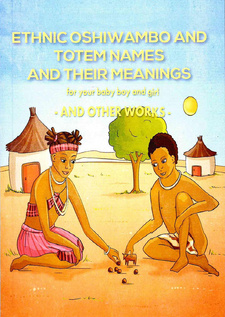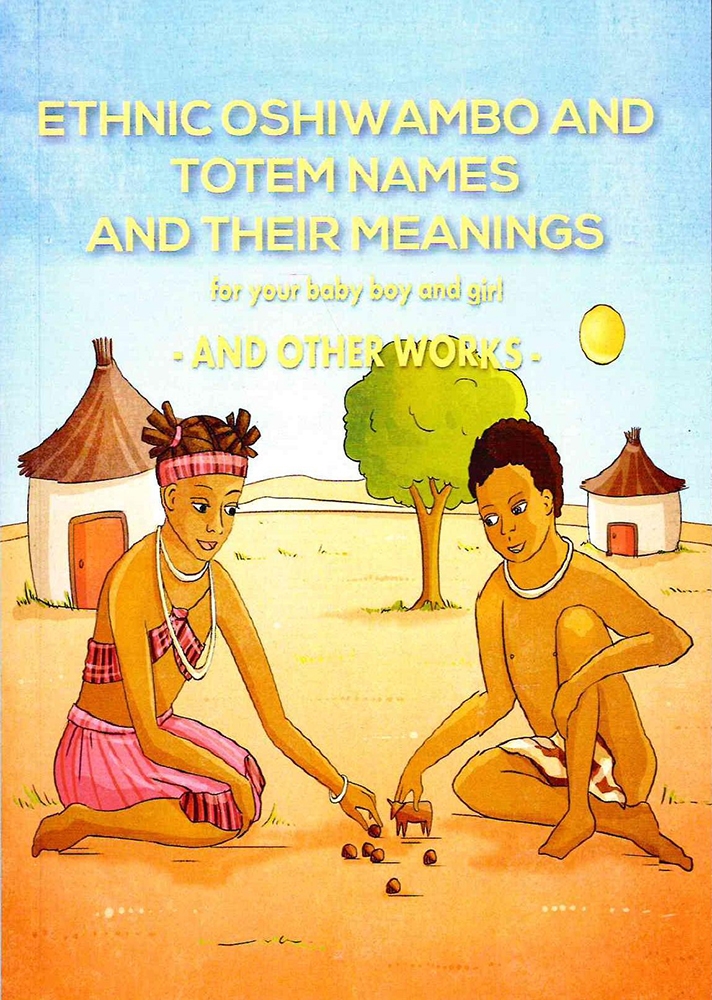Ethnic Oshiwambo Names and Their Meanings, by Simon and Lineekela Nakapunda

Ethnic Oshiwambo Names and Their Meanings, by Simon and Lineekela Nakapunda. 3rd edition. Windhoek, Namibia 2020. ISBN 9789994589166 / ISBN 978-99945-89-16-6
Ethnic Oshiwambo Names and Their Meanings, by Simon and Lineekela Nakapunda. Twins are regarded as a special blessing, and therefore are named for kings and queens.
Simon Hamunyela Nakapunda Mwahalondjila Eunice Lineekela Nakapunda
[...] The Oshiwambo word for twins, ehamba, means kings as well. A child is always named after a king or queen of the specific tribe he or she belongs to. It is for this reason that most male Aawambo twins are named Mandume, Nande, Weyulu, or Haimbili, and females are named Ndatyooli, Ndaavele, Ndapona, Ndilokelwa, or Mwadinomho. When the missionaries came, they made people understand and believe that to be Christians, they had to leave their traditional beliefs and ways, including traditional names, behind before they could be bapti2ed. The traditional name was then given at birth and a new biblical name adopted after baptism. The most popular biblical names were Jacob's sons and Jesus's disciples for boys and names like Mary, Anne, Esther, and Ruth for girls. In time, however, people gained a better understanding of Christianity and determined that traditional names are not pagan. From that point onwTards, traditional names were acceptable for baptism. It is now up to each individual's discretion as to which name is chosen, and most people now choose traditional names. If you decide to use a traditional name for your child, you can refer to the list of names and their meanings included in this book to help you choose the one that is most appropriate for your child. [...]
Suggested Guidelines to Follow When Naming Your Child
Giving your child a name is one of the most sacred, treasured, and important moments of having a baby. This name transmits the name giver's message and will be carried by the child for the rest of his or her life, so it is important to give your child a beautiful, meaningful name. The message will be spread and heard by many people and will have an effect on a wide variety of people. The name will be called by its parents, relatives, and all visitors to the home. The name will be called by other children as they play together. The name will be called by teachers and other students from the time that he or she is in kindergarden, all the way through primary and secondary school, university, and the work environment. This message will be heard and spread throughout these avenues. Even when the child dies, the name will still carry the message, and this message will never die, as it will also be engraved on the tombstone. It is thus imperative that you give a child a name that has a wonderful message, a name that has meaning, and one that a child will be happy to carry. The name-giving process should be taken seriously so that it can take this message into the whole nation. The Ministry of Home Affairs in Namibia limits first names to thirty-six characters, which translates roughly to four or five names, depending on the length of each name chosen. We suggest that you avoid giving names that are difficult or shameful for the child to bear, as he or she will tend to shy away from that name. In 2014, Peya Mushelenga, who was the deputy foreign minister at the time, urged lawmakers to amend the child protection law, which would make it unlawful for fathers to give children names that had negative connotations, names that fathers used to settle scores with their relatives and neighbours. [...]
This is an excerpt from Ethnic Oshiwambo Names and Their Meanings, by Simon and Lineekela Nakapunda.
Title: Ethnic Oshiwambo and Totem Names and Their Meanings
Authors: Panelulcni Hamunyela Simon Nakapunda; Mwahalondjila Eunice Lineekela Nakapunda
Self published
3rd edition. Windhoek, Namibia 2020
ISBN 9789994589166 / ISBN 978-99945-89-16-6
Softcover, 15 x 21 cm, 488 pages, text English and Oshiwambo
Nakapunda, Panelulcni Hamunyela Simon und Nakapunda, Mwahalondjila Eunice Lineekela im Namibiana-Buchangebot
Ethnic Oshiwambo and Totem Names and Their Meanings
Close to 1000 ethnic Oshiwambo and Totem Names and Their Meanings compiled by two Owambo authors.

